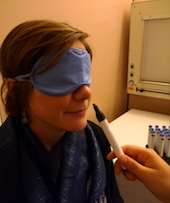Not senseless -- watching the brain relearning the sense of smell

Neural and biochemical processes that are affected by the loss of olfactory sensory perception are now being explored. These studies provide insight into the effects of the loss of smell on corresponding relevant brain areas. One such project, conducted with support from the Austrian Science Fund FWF, is studying the reasons behind this illness that, surprisingly, affects many people. In particular, the processes in individuals who learn to smell again after having lost this ability are being examined.
Even though we sometimes wish it were less, we collect 20% of our information on our environment with our sense of smell. Our olfactory functions are not only very highly developed, they also have important social functions – something which individuals who no longer have a sense of smell strongly experience. This neural disease, known as anosmia, often leads to poor nutrition, depression and seclusion. Although up to 5% of the population suffers from total loss of olfactory functions – and 15% suffer from reduced olfactory function – little is known about the impact of this loss on higher neural processes. This is now being studied at the Medical University of Vienna in a newly launched project from the Austrian Science Fund FWF. The study makes use of a phenomenon that has only recently been discovered: through special training, some anosmics recover their sense of smell.
Olfactory Fitness Program
With regard to this specialized research approach, project manager Dr. Veronika Schoepf, Department of Neuroradiology and Musculoskeletal Radiology at the University Clinic of Radiology comments that, "in recent years it has become known that patients can regain a certain amount of odour perception through special training methods. Just as little is known as yet on how the training works, the same holds true for the neural processing of chemosensory information in those affected. Regaining the sense of smell offers us the opportunity to learn more about the impact of anosmia on neural processes."
One method that Dr. Schoepf uses for her work is fMRI (functional magnetic resonance imaging). This type of magnetic resonance imaging enables visualize physiological processes in the human body. Due to its non-invasive operating principle, fMRI can be used for studies in particularly sensitive areas, such as the brain.
One part of the project is now focussed on investigating whether the special olfactory training also affects the activity of individual brain regions, such as the olfactory cortex. A comparison of the activities before and after such training provides additional information and clarifies whether other brain structures are activated to compensate for the loss of smell.
A further compensatory mechanism may occur in the trigeminal nerve – an important nerve for olfactory perception. To clarify this hypothesis, the team led by Dr. Schoepf will compare chemosensory stimuli along the nerves of healthy subjects and those affected by using fMRI. At the same time, energy consumption and the relative concentrations of neurotransmitters are also measured.
Sniffing for Science
Dr. Schoepf is also studying a very specific process of smelling in more detail, namely sniffing. According to Dr. Schoepf: "Today we know that sniffing is more than just an intense form of suction of air into the nasal cavity. Sniffing actually increases neural activity in the olfactory cortex. This even occurs when no odorant is absorbed. What we now want to know is whether this type of neural activation is also possible in the brains of individuals with anosmia."
The results of this interdisciplinary project by medical doctors, physicists and odour researchers will provide an important basis for understanding anosmia – and can simultaneously contribute to the development of possible new treatments. In addition, this project, supported by the FWF, offers basic insight into the neural processes of one of our most important senses.















